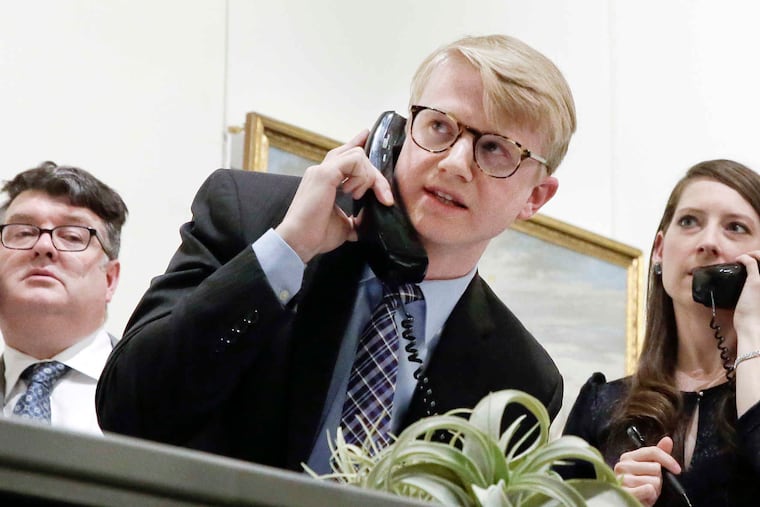Freeman’s, Philly’s 218-year-old auction house, is merging with Hindman
The move gives the new company a combined six salesrooms and 18 regional offices across the U.S., the biggest “coast-to-coast presence” of any auction house in the country.

America’s oldest auction house is getting bigger.
Freeman’s, the Center City institution that has been selling art and other collectibles since Thomas Jefferson was president, is merging with Chicago-based Hindman in a deal that will expand the 218-year-old Philadelphia company’s national profile.
The move gives the new company, Freeman’s | Hindman, a combined six salesrooms and 18 regional offices across the United States, the biggest “coast-to-coast presence” of any auction house in the country, according to a news release Tuesday. That includes a new 5,000-square-foot salesroom opening this month in New York’s Upper East Side art district. Freeman’s | Hindman will use a single website.
While Hindman brings the biggest footprint of any U.S. auction house to the new entity, Freeman’s adds its long-standing partnership with Scottish auctioneers Lyon & Turnbull — an international presence upon which executives plan to build.
“We’d hit a bit of a plateau, I think. We’re looking to grow. We’re ambitious,” said Freeman’s chairman, Alasdair Nichol, who will be deputy chairman of the new company. He described Hindman as a good fit, noting that both firms are full-service auction houses.
Alyssa D. Quinlan, the merged firm’s chief executive, said the merger’s benefits go beyond having an expanded footprint. “It is the fact that Freeman’s team has such deep expertise within so many categories,” Quinlan said in an interview, pointing in particular to Freeman’s strength in Pennsylvania Impressionist paintings.
The merger comes as the art market, generally seen as resilient in the face of economic headwinds, has dipped amid high interest rates and war in Ukraine and the Middle East. Sales of art by the three biggest auction houses — Sotheby’s, Christie’s, and Phillips — declined 27% in 2023 to $5.76 billion, according to London-based market research firm ArtTactic.
That came after a record year for the industry in 2022, however, as new buyers flush with cash discovered the art market online during the pandemic.
Freeman’s and Hindman had combined sales of $132 million last year, a spokesperson said. Hindman’s sales were flat year-over-year, said Quinlan, who was appointed Hindman’s CEO in January 2023.
Much of Hindman’s business originates from estate sales, she said. Higher interest rates meant a slowdown in the housing market, as many potential buyers couldn’t afford the increased borrowing costs. That, in turn, limited the supply of material that could be sold from estates. But demand has remained strong, and the Federal Reserve has signaled it will likely cut rates later this year.
“We will see things move a little bit more in terms of supply” once rates go down, Quinlan said. “We are hopeful and optimistic we’ll continue to see demand. Good property is always sought after. It’s just a matter of being able to find property and tell the story and get that to as many buyers as we can globally.”
Quinlan said the new firm would continue to offer appraisals for insurance needs, financial planning, and estates.
Freeman’s long history in Philadelphia
The deal marks the latest change for Freeman’s, which began in 1805 when Pennsylvania Gov. Thomas McKean appointed Tristram Bampfylde Freeman official auctioneer in Philadelphia. That’s in contrast with big New York houses such as Christie’s and Sotheby’s, which started in Europe.
Freeman’s stayed in the family for six generations until its management team acquired a controlling interest in 2016.
Samuel T. Freedman & Co. helped establish Philadelphia’s reputation as the go-to market for antiques. Long guided by an old motto “Omnia praeter amicos vendimus” — which roughly translates to “We sell everything but our friends” — Freeman’s once sold everything from a first printing of the Declaration of Independence to secondhand furniture.
Over time the company prioritized quality over quantity. When Nichol joined Freeman’s in 1999, the company was selling 50,000 lots a year. He helped cut that figure down to about 10,000, focusing on higher-end pieces, some of which fetched seven figures. “Which was unheard of before,” Nichol said in an interview. “But we could see we really needed to grow further.”
Today it is known for sales of Pennsylvania Impressionist paintings. Among Freeman’s 2023 offerings was early 20th-century artist N.C. Wyeth’s Jetty Tree, which sold for $2.45 million — eight times above the presale high estimate. The painting had been on loan to the Brandywine Museum of Art. Other recent highlights include the 2021 sale, for $4.4 million, of a rare parchment engraving of the Declaration of Independence that was ordered up by John Quincy Adams in 1820.
Adapting to the digital age
Freeman’s had to reinvent itself for the digital age, as local customers of midsize regional auction houses found they had access to international markets online. To that end, the company found new U.S. customers through regional offices in such cities as Boston and Richmond, Va.
Expansion became a key priority when the company’s managers — including Nichol, chief operating officer Hanna Dougher, and president Paul Roberts — bought the company in 2016. A few years later, Freeman’s sold its longtime headquarters at 1808 Chestnut St. and moved into the Schuylkill waterfront office building anchored by Aramark on Market Street.
Amid the changes, the Philadelphia market remains an important source of material, as sellers “know we are a portal to the world art market,” Nichol said. “That is going to increase even more so with this merger given the range of locations we’ll have across the United States.”
Hindman was formed through the 2019 merger of Leslie Hindman Auctioneers, founded in 1982, and Cowan’s Auctions, established in 1995.